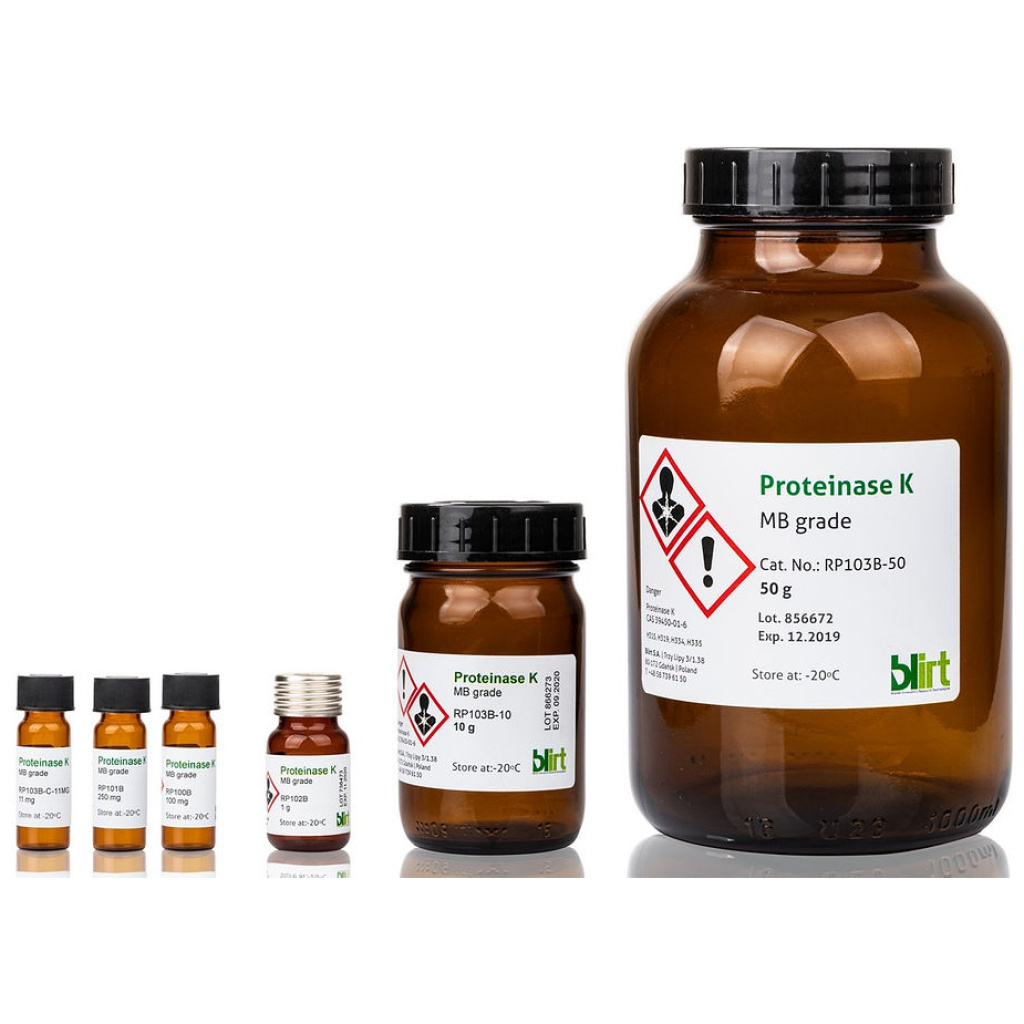Description
| Name | Part Number | Pack Size |
| Proteinase K | RP100B | 100 mg |
| RP101B | 250 mg | |
| RP102B | 1000 mg |
DNA/RNA free proteinase K with high specific activity from small to bulk quantities and at unbeatable prices guaranteed. Full activity at room temperature up to 12 months.
Mutagen and recombinant Proteinase K from Tritirachium album is non-specific, subtilisin-related serine protease [1] with a very high specific activity. The enzyme cleaves peptide bonds at the carboxylic sides of aliphatic, aromatic or hydrophobic amino acids. The smallest peptide to be hydrolyzed by this enzyme is a tetrapeptide. Proteinase K is supplied as a lyophilized powder.
Properties
– specific activity: approx. 30 u/mg
– stable over a wide pH range: 4.0-12.5, optimum pH 7.5-8.0
– not inactivated by metal chelators, by thiol-reactive reagents or by specific trypsin and chymotrypsin inhibitors
– the activity of the enzyme is stimulated by 0.2-1% SDS or by 1-4 M urea
– Ca2+ protects Proteinase K against autolysis, increases the thermal stability and has a regulatory function for the substrate binding site of Proteinase K [6]
Applications
– purification of target material from contaminating proteins
– isolation of genomic DNA and mRNA from cultured cells [3]
– removal of DNases and RNases when isolating DNA and RNA from tissues or cell lines [2,3]
– determination of enzyme localization [4]
– improving cloning efficiency of PCR products [5]
References
1. Ebeling, W., et al., Proteinase K from Tritirachium album Limber, Eur. J. Biochem., 47, 91-97, 1974.
2. Wiegers, U., Hilz, H., A new method using ‘proteinase K’ to prevent mRNA degradation during isolation from HeLa cells, Biochem. and Biophys. Res. Commun., 44, 513-519, 1971.
3. Hilz, H., et al., Stimulation of proteinase K action by denaturing agents: application to the isolation of nucleic acids and the degradation of “masked” proteins, Eur. J. Biochem., 56, 103-108, 1975.
4. Brdiczka, D., Krebs, W., Localization of enzymes by means of proteases, Biochim. Biophys. Acta, 297, 203-212, 1973.
5. Crowe, J.S., et al., Improved cloning efficiency of polymerase chain reaction (PCR) products after proteinase K digestion, Nucleic Acids Res., 19, 184, 1991.
6. Bajorath, J, et al, The enzymatic activity of proteinase K is controled by calcium., Eur. J. Biochem., 176, 441-447, 1988.


